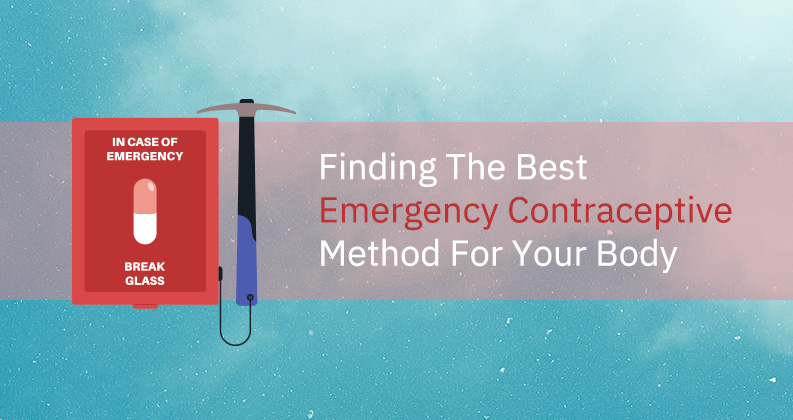
For many people, the idea of an unplanned pregnancy is scary. But it can be downright terrifying for those with limited access to health care or at high risk for sexually transmitted infections (STIs). Emergency contraception gives you more control over your reproductive health. It helps prevent pregnancy after unprotected sex or when a birth control method fails, such as by not being able to take your pills on time, missing a shot from an injectable contraceptive like Depo-Provera®, or getting your cycle off track due to stress.
What is emergency contraception?
Emergency contraception is a way to prevent pregnancy after unprotected sex or contraceptive failure. Emergency contraceptives are not intended for routine use and are not abortion pills, nor are they the same as the pill (birth control). They do not protect against sexually transmitted infections (STIs) like HIV/AIDS and certain cancers of the reproductive system.
They are also not condoms but rather a way to prevent pregnancy if you have unprotected sex or there was a failure in your current method of protection (i.e., condom broke).
Types of emergency contraception
There are two ways to prevent pregnancy after unprotected sex: emergency contraceptive pills and intrauterine devices (IUDs). Both are effective if you take them within the first 120 hours (five days) after intercourse.
The emergency contraceptive pill (AKA the morning-after pill) works by stopping or delaying ovulation, preventing fertilization in your uterus. It also affects implantation, when the egg burrows into your uterine wall and develops into a blastocyst—the beginning stages of pregnancy. The longer you wait before taking this medication, the less likely it will be effective for you. Emergency contraception pills can be taken up to 120 hours (five days) after unprotected sex; however, studies have shown that taking ella at any point during those five days will still help prevent pregnancy.
The most effective type of IUDs is one called paragard® T 380 A LNG 20 mcg/day and lasts up to ten years depending on where in your uterus it's inserted—you can get this kind of IUD within 120 hours (five days) after having unprotected sex. It'll be as effective immediately as it would be later down the road!
Who can use emergency contraception?
Most women can use the emergency contraceptive pill, which is safe for most women and girls under 16 years old. However, you may not be able to take the emergency contraceptive pill if:
● You are allergic to anything in it (e.g., polyethylene glycol [PEG], lactose).
● You have severe asthma or take any medicines that may interact with it (e.g., prednisolone; rifampin).
If you want to use an emergency contraceptive, tell your doctor what medicines you are taking before starting on a new one so that they can check if this is suitable for use with your current health status and medications.
If you're 17 or older and have access to a pharmacy, you can purchase emergency contraceptive pills without a prescription.
If you're 17 or older and have access to a pharmacy, you can purchase emergency contraceptive pills without a prescription.
The price of emergency contraceptive pills varies depending on the brand and where you buy them, and plan B One-Step costs about $50 at a drugstore. If you're insured with your college's health plan, this method might be covered under your plan's formulary. If not, there will be an out-of-pocket cost for Plan B One-Step or generic levonorgestrel pills.
Emergency contraception works best if it's taken soon after unprotected sex but can also work up to five days after unprotected sex as long as three conditions are met: You're reasonably sure that no other form of birth control was used; it has been less than 72 hours since unprotected intercourse, and nothing has happened since then that would make pregnancy more likely (such as having more sex).
You're not too old to use emergency contraception.
Young people are the most likely to become pregnant, but that doesn't mean you're too old to use emergency contraception. In fact, according to Planned Parenthood, “no matter what your age is, if you have unprotected sex and suspect pregnancy within 120 hours (5 days) of having sex or think you may have been exposed to a birth control failure such as condom breakage or slipping out of place during intercourse”—you can get emergency contraceptive pills without a prescription at any Planned Parenthood health center.
No matter what your age is and whether or not you're seeking an abortion after using Plan B One-Step® (the most popular brand name), there are effective ways to prevent unwanted pregnancies from happening in the future. Consider switching up your birth control method if it's been more than 15 years since its last expiration date or if its effectiveness has decreased due to age-related changes such as reduced hormone levels over time - especially if this type isn't considered "highly effective" on its own!
Emergency contraception is safe for people with certain health conditions.
It’s important to know that emergency contraceptive pills are safe for most people but are not suitable for everyone. For example, suppose you have a personal or family history of breast cancer, liver tumors, or uterine cancer and are using estrogen-based emergency contraception (like Plan B One-Step). In that case, your doctor may recommend using ParaGard instead.
Copper IUDs are another type of long-term birth control used as emergency contraception up to five days after intercourse. They can also be effective at preventing pregnancy for up to 12 years after insertion (though this varies based on the brand). However, because it's inserted into your uterus by a medical professional with experience inserting various types of intrauterine devices (IUDs), Copper T 380A is not recommended for people with certain health conditions like heavy bleeding or uterine fibroids. In addition, copper IUDs do not protect against sexually transmitted infections (STIs), including HIV/AIDS, nor do they prevent pregnancy when used as regular birth control methods (though some brands may claim otherwise).
If you're unsure whether an IUD is right for you but still want some form of emergency contraception in case things go wrong at one point during your menstrual cycle—or even if things go wrong more than once—talk with your gynecologist about which kind might work best for you!
Other options exist for people who can't take estrogen-containing emergency contraceptive pills.
If you can't take the estrogen-containing EC pills, there are other options out there for you. The copper IUD (or IUD with progestin) is an excellent option for people who don't want to use hormonal methods. The copper IUD creates an inflammatory response in your body and prevents sperm from reaching eggs by affecting their motility. This method is more effective at preventing pregnancy than standard condoms but less effective than using Plan B or ella as emergency contraceptive pills.
The progestin IUD works similarly to the copper IUD in that it creates an inflammatory response in your uterus. Still, it also thickens cervical mucus so that sperm cannot enter the uterus effectively (and increases the effectiveness of barrier methods). Side effects may include irregular bleeding or spotting during the first 3-6 months after insertion; however, most women will experience less bleeding and more stable periods while using this form of contraception compared to those on birth control pills or not using any type of contraception at all!
How effective are emergency contraceptive pills?
If you've had unprotected sex, the sooner you take emergency contraceptive pills, the more effective they will be. According to Planned Parenthood, "EC can prevent up to over 95% of pregnancies when taken within five days after intercourse."
To be most effective, you must take EC as soon as possible, within 120 hours (5 days) after unprotected sex. This window narrows as time goes on and becomes even narrower if you're using a copper IUD for EC because copper IUDs have a higher failure rate than other methods of EC.
How effective are copper IUDs as emergency contraception?
Copper IUDs are the most effective form of emergency contraception, and they have a failure rate of less than 1%, which means they're more than 99% effective as emergency contraception. Copper IUDs can be used as emergency contraception for up to 5 days after unprotected sex, and they work by preventing fertilization.
If you've had unprotected sex in the past five days and are worried about pregnancy, call your doctor or go to an urgent care clinic where they can help you decide if a copper IUD is right for you!
Emergency contraception has advanced dramatically over the years, giving people many safe and effective options.
If you're concerned about the side effects of emergency contraceptives, it's important to know that a lot has changed in recent years. Many people who couldn't take hormonal methods due to health conditions can now use an emergency contraceptive that doesn't contain any hormones.
And while these methods are still effective as backup contraception if you have unprotected sex before your period is due, they aren't meant for routine contraception. If you're not comfortable relying on backup when you're having sex regularly and want something more consistent long-term, other options might be better suited for your needs.
Conclusion
We hope this article has helped you understand emergency contraception and its various methods. If you think you might need it in the future, we urge you to speak with your doctor about which way will work best for your body.









